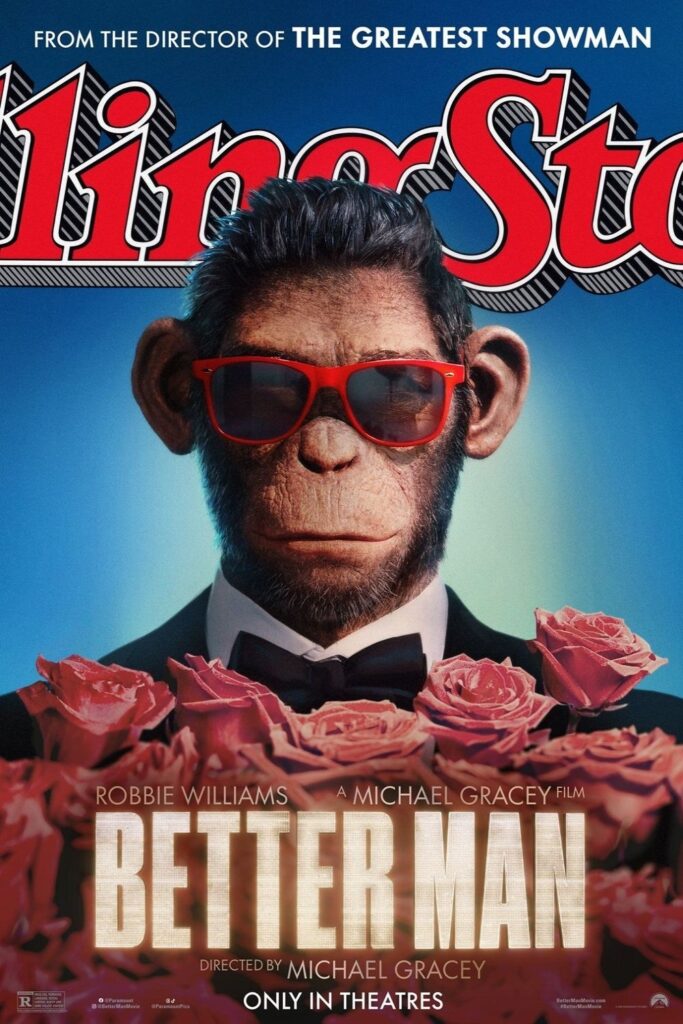Better Man (2024) is a distinctive musical biopic that delves into the life of British pop icon Robbie Williams, directed by Michael Gracey, renowned for The Greatest Showman. The film uniquely portrays Williams as a CGI chimpanzee, symbolizing his self-perception and struggles with fame.
The narrative begins in 1982, introducing young Robert (Carter J. Murphy) in Stoke-on-Trent. An early incident during a football game sets the stage for his later challenges. At home, his father Peter (Steve Pemberton), an aspiring entertainer, imposes a belief that success is reserved for the innately talented, dampening Robert’s aspirations. Conversely, his grandmother Betty (Alison Steadman) offers unwavering support, nurturing his potential.
Robert’s participation in a school play reveals his innate talent, captivating audiences with his singing and improvisation. However, visions of critical inner voices haunt him, reflecting his internal struggles. His father’s departure to pursue a comedy career leaves a void, prompting Robert, his mother Janet (Kate Mulvany), and Betty to adapt to new circumstances. A school counselor’s discouragement further challenges his musical ambitions.
A pivotal moment arises when Robert auditions for the boy band “Take That,” led by manager Nigel Martin-Smith (Damon Herriman). Despite initial reservations, Nigel is intrigued by Robert’s audacious confidence. Within the band, Robert, now “Robbie,” grapples with limited creative input, particularly as Gary Barlow (Jake Simmance) assumes songwriting duties. Performances in various venues, including gay clubs, offer Robbie a sense of belonging, yet Nigel’s authoritarian approach stifles his burgeoning star power.
As Take That ascends, Robbie battles substance abuse and self-destructive behaviors. A critical juncture occurs when the band decides to proceed without him, leading to a downward spiral culminating in a car accident. A romance with Nicole Appleton (Raechelle Banno) offers solace but is marred by external pressures, including an unexpected pregnancy and subsequent abortion, deepening Robbie’s turmoil.
The film candidly addresses Robbie’s internal battles, depicting his struggles with self-doubt, depression, and addiction. The unconventional choice to represent him as a CGI chimpanzee underscores his feelings of alienation and the performative nature of his existence.
A poignant visit to his ailing grandmother Betty leads to profound reflections on connection and regret. Collaborating with songwriter Guy Chambers (Tom Budge) reignites his creativity, though addiction continues to loom. An interview with Michael Parkinson (John Waters) prompts introspection about his career and personal relationships. Betty’s passing propels Robbie toward rehabilitation, confronting his “Robbie” persona and seeking healing.
The film culminates in a triumphant comeback at the Royal Albert Hall, symbolizing Robbie’s journey toward self-acceptance and redemption. The narrative intertwines his personal and professional struggles, offering an emotionally resonant portrayal of an artist’s quest for identity amidst the tumult of fame.
“Better Man” stands out for its inventive approach, blending fantasy elements with the traditional biopic format. The film’s bold narrative choices and visual flair provide an emotionally engaging and refreshingly honest depiction of Williams’ life, distinguishing it within the genre.
Better Man offers a surreal yet heartfelt exploration of Robbie Williams’ life, capturing the complexities of his journey with a unique and imaginative lens.

